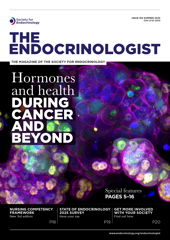HHLA2 AS A BIOMARKER AND TREATMENT TARGET IN ENDOCRINE CANCER
|
Hot topics
Human endogenous retrovirus-H long terminal repeat-associating 2 (HHLA2), a member of the B7 family, is an emerging immune checkpoint molecule. It has potential therapeutic relevance, particularly in cancers resistant to PD-1 (programmed cell death-1) and CTLA-4 (cytotoxic T-lymphocyte antigen-4) inhibitors. This review by Gruetzmacher et al. consolidates data on HHLA2 expression in endocrine-related cancers and its prognostic implications.
Of 117 studies that were screened, 12 met the inclusion criteria. Findings reveal variable HHLA2 expression across endocrine tumours, influenced by both cancer type and tumour microenvironment. In pancreatic and some ovarian cancers, high HHLA2 expression correlated with better survival outcomes. However, in thyroid and neuroendocrine tumours, elevated levels were linked to aggressive features, metastasis and poor prognosis. The dual role of HHLA2 – acting either as an immune activator or suppressor – appears to be context- dependent, shaped by interactions with receptors TMIGD2 and KIR3DL3 on T and NK cells.
Given its limited expression in healthy tissues and its prevalence in PD-L1 (programmed cell death ligand-1)-negative tumours, HHLA2 presents a promising immunotherapy target. The review also highlights the need for further studies, particularly using humanised models and chimeric antigen receptor-modified T (CAR-T) strategies, to fully understand HHLA2’s functions and therapeutic potential. Overall, this research lays the groundwork for HHLA2’s integration into future cancer immunotherapy approaches.
Read the full article in Endocrine Oncology 5 e240034 https://doi.org/10.1530/EO-24-0034





